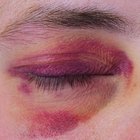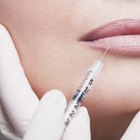
Essential oils get their power from volatile compounds in leaves, stems and flowers. Though essential oils are often considered natural remedies, their effects can be as strong as the effects of some medications--and in some cases, they can have the same potential for toxicity if they're used excessively or incorrectly. Peppermint oil is a good example--it can have beneficial effects when it's used correctly but may be toxic in large doses.
The Facts
Oil is extracted from the leaves and stems of the peppermint plant to make peppermint oil. One of the active ingredients in peppermint oil is a volatile oil called menthol, which can be toxic in its pure form. Menthol gives peppermint oil its decongestant and expectorant power and may play a role in its stomach-soothing abilities. Menthol is an ingredient in a number of products. Peppermint oil's strong taste makes it a common flavoring agent, but peppermint oil is also used in products for its germ-killing powers, for its mild numbing ability and for its ability to calm spasms, particularly stomach spasms. It's generally safe for topical application and in milder concentrations.
Identification
According to MedLine Plus, the online health information resource maintained by the U.S. National Library of Medicine and the National Institutes of Health, there are several symptoms that may indicate you have consumed a potentially toxic amount of peppermint oil. You may experience a slowed heartbeat; shallow, slow or rapid breathing; gastrointestinal discomfort, including nausea, vomiting, diarrhea and abdominal pain; flushed skin; or convulsions, dizziness or uncoordinated movements. In some cases, very large quantities of menthol may cause kidney problems or unconsciousness.
Prevention
According to New York University's Langone Medical Center, peppermint oil is usually safe when it's taken in appropriate doses in enteric-coated capsules. Limit your intake of peppermint oil to one to two capsules--the equivalent of 0.2 milliliters (mL)--each day to reduce toxicity risk.
Treatment
If you do ingest a toxic amount of peppermint oil or experience any symptoms of overdose after taking peppermint oil, call your health-care provider or poison control center immediately. According to the University of Maryland Medical Center, early treatment increases your likelihood of full recovery. Depending on your symptoms, medical treatment for peppermint oil overdose may include activated charcoal, breathing support, intravenous feeding or gastric lavage.
Considerations
Peppermint oil's potential toxicity makes it especially dangerous, and the University of Maryland Medical Center recommends avoiding peppermint oil use in infants and young children. Menthol overdoses usually only require a few days for recovery, but if kidney damage occurs, it can take months for complete recovery.
Related Articles

Jojoba Oil Benefits

Can Borage Oil Help Acne?

Anise Seed Cautions and Side Effects

What Is the Initial Breakout From ...

What Is Aloe Good For?

Arnica for Acne

Bromelain & Bruising

Peppermint Oil for a Cough

How to Treat Hematoma & Swelling After ...

Is Proactive Too Strong for Sensitive ...

Zinc Treatment for Rosacea

Skin Benefits of Eating Coconut Oil

The Difference Between Retin A & Renova

Herbs That Cause Photosensitivity

Aloe Vera Gel As a Wrinkle Reducer

Fraxel Repair Vs. Restore Results

Side Effects of Certain Dri

Is Allantoin a Relative of the Lanolin ...

Pycnogenol and Acne

Clove Oil & Pimples
References
Writer Bio
Holly Roberts is an award-winning health and fitness writer whose work has appeared in health, lifestyle and fitness magazines. Roberts has also worked as an editor for health association publications and medical journals. She has been a professional writer for more than 10 years and holds a B.A. in English and an M.A. in literature.
Photo Credits
ginger mint image by hazel proudlove from Fotolia.com